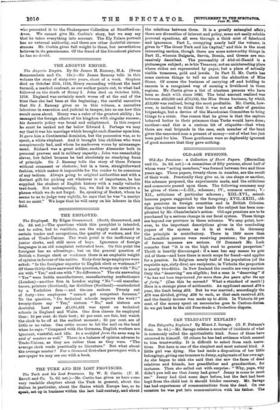THE ANGEVIN EMPIRE.
The Angevin Empire. By Sir James H. Ramsay, M.A. (Swan Sonnenschein and Co. 12s.)—Sir James Ramsay tells in this volume the story of sixty-two years, short of a week. Stephen died on October 25th, 1154, Henry succeeding without the least turmoil, a marked contrast, as our author points out, to what had followed on the death of Henry I. John died on October 19th, 1216. England was certainly much worse off at the end of the time than she had been at the beginning ; the careful narrative that Sir J. Ramsay gives us in this volume, a narrative laborious in execution and judicial in temper, lets us see how this result came about. Henry was a ruler of the greatest ability ; he managed the foreign affairs of his kingdom with singular success ; his domestic policy was broad and enlightened. In this respect he must be ranked not far below Edward I. Perhaps we may say that it was his marriage which brought such disaster upon him. It gave him a Continental dominion, but the possession was, so to speak, a white elephant. And it brought him children who were conspicuously bad, and whom he made even worse by mismanage- ment. Richard was a great soldier, another Alexander both in personal prowess and in military capacity ; John was remarkably clever, but failed because he had absolutely no steadying force of principle. Sir J. Ramsay tells the story of these Princes without ornament or rhetoric ; but in a terse, straightforward fashion, which makes it impossible for the reader to be conscious of any tedium. Always going to original authorities and with a distinct gift for picking out whatever is of importance, he has supplied the student of English history with a really valuable
text-book. Not unfrequently, too, we find in his narrative a phrase which we do not forget. So, speaking of Becket, whom he seems to us to judge very rightly, he says that he was " a martyr but no saint." We hope that he will carry on his labours in this field.






















































 Previous page
Previous page